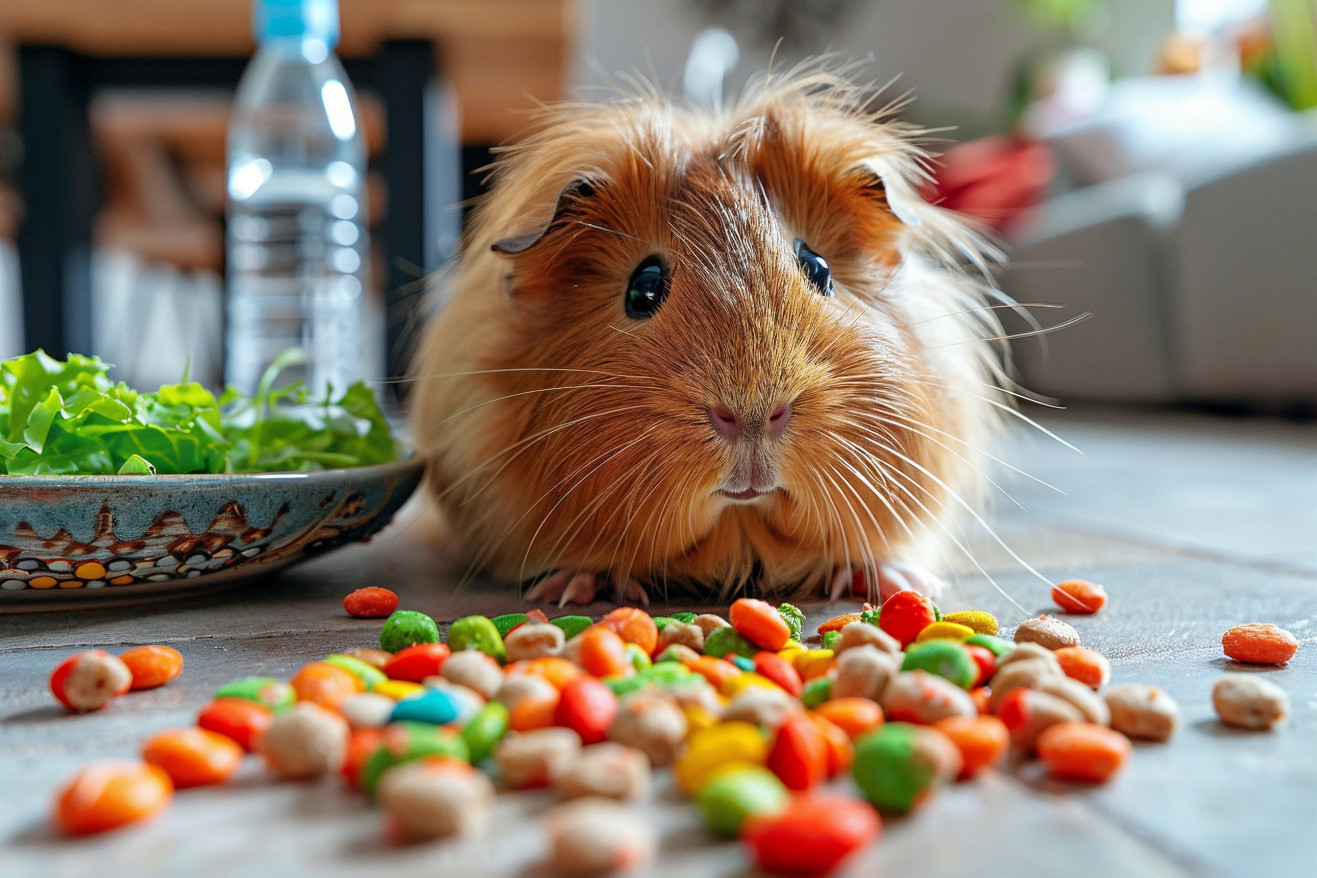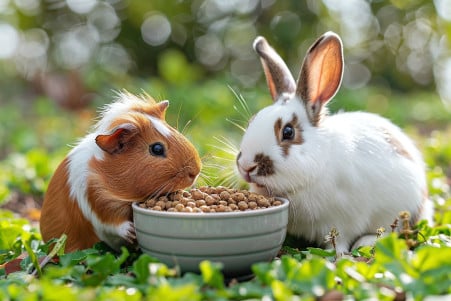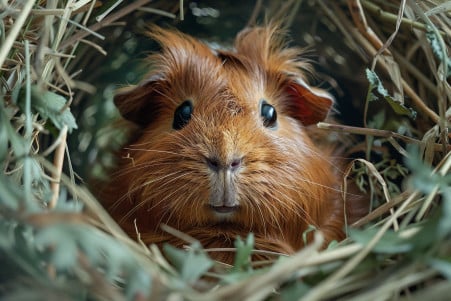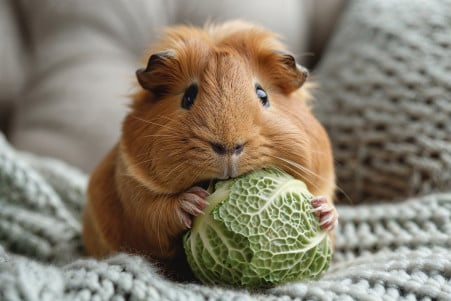Can Guinea Pigs Eat Hamster Food? What Their Diet Needs
1 April 2024 • Updated 1 April 2024

If you're wondering whether or not your guinea pig can eat some of the hamster food you have at home, you may be surprised to learn that the two animals have very different dietary needs. In fact, guinea pigs should not eat hamster food at all, as it does not contain the vitamin C that is essential to their diet. In addition, hamster food is higher in fat and protein than guinea pigs need, and regular consumption can lead to obesity and other health problems.
This article is based on scientific evidence, written by experts. These studies provide valuable insight into the nutritional requirements of guinea pigs, and they emphasize the importance of feeding guinea pigs a well-balanced diet that includes timothy hay, fresh vegetables, and fortified pellets. By learning about guinea pigs' nutritional needs, you can make sure you're feeding your pet the right diet and avoiding foods like hamster food that can be harmful to them.
Can guinea pigs eat hamster food?
Why Hay Is Important in a Guinea Pig's Diet
Hay is the foundation of a guinea pig's diet and is critical for healthy digestion and dental health. In fact, it should account for a whopping 80-90% of what guinea pigs eat every day, according to The Humane Society.
Of the grass hays, timothy hay is the best option because it has the highest fiber content and the lowest protein and calcium content. In addition to timothy hay, Oxbow Animal Health recommends orchard grass, which is soft and easy to chew, as well as meadow hay and botanical hay blends, which offer variety.
Guinea pigs need constant access to fresh, high-quality hay to ensure their digestive systems work properly and to help keep their teeth from getting too long. Not getting enough hay can lead to serious, life-threatening conditions like gastrointestinal stasis and dental disease. On the other hand, legume hays such as alfalfa are not recommended for adult guinea pigs because they have too much protein and calcium, which can lead to obesity and urinary tract issues.
Fresh Veggies and Fruits: Important Food Groups
Guinea pigs need a daily serving of fresh veggies, equal to 1-2 cups per adult guinea pig. Prioritize leafy greens such as romaine lettuce, cilantro, and kale, all of which are good sources of vitamin C. These greens should be the "salad base" according to the Southern California Guinea Pig Rescue.
Other recommended vegetables are carrots, bell peppers, cucumber, and peas in small amounts. Yellow vegetables like corn and sweet potato are also listed as healthy options by The RSPCA. Fruits like berries, melons, and bananas can be given as treats, but they should be limited because of their high sugar content.
Some vegetables, including spinach and rhubarb, are high in oxalates, which can lead to bladder stones, according to Oxbow Animal Health. It's important to make sure that guinea pigs are getting the right amount of food and that they're getting a variety of foods to ensure that they're getting a well-rounded diet.
The Importance of Fortified Pellets and Portion Control
Guinea pigs need a small daily serving of timothy hay-based, vitamin C-fortified pellets to round out their diet. The Guide to a Balanced Diet for Guinea Pigs recommends a serving size of approximately 1/8 to 1/4 cup per adult guinea pig each day.
Make sure the pellets are plain and don't contain added seeds, nuts, or sugars, as wikiHow points out that these ingredients can lead to health problems. Overfeeding any part of the diet, including pellets, can lead to obesity and the associated health problems, including fatty liver disease.
In order to make sure your guinea pig maintains a healthy weight, Omlet suggests adjusting portion sizes based on your guinea pig's age, how much exercise they get, and whether they need to lose or gain weight. It's important to make sure that you're feeding your guinea pig a balanced diet that includes hay, fresh vegetables, and the appropriate portion of fortified pellets in order to meet all of their nutritional needs.
Malnutrition and Other Health Conditions in Guinea Pigs
Vitamin C deficiency, or scurvy, is a potentially life-threatening condition in guinea pigs. According to VCA Animal Hospital, symptoms of vitamin C deficiency include weight loss, dental problems, lethargy, and an increased risk of infections. The Merck Veterinary Manual adds that a lack of collagen from vitamin C deficiency can cause symptoms like swollen joints, bleeding, and lameness.
A lack of fiber is another major concern. As mentioned in the previous section, a lack of hay can cause gastrointestinal stasis, a life-threatening condition where the digestive system slows down or stops. The Veterinary Nurse explains that digestive issues such as diarrhea are often related to diet, and are often the result of sudden dietary changes or low-quality diets.
On the other hand, overfeeding can lead to obesity, which can cause serious health problems such as fatty liver disease, metabolic problems, and pregnancy complications, according to The Veterinary Nurse. Other symptoms of malnutrition include a lackluster coat, poor skin and fur quality, and weakness or lethargy.
If any symptoms of malnutrition or other health conditions related to malnutrition are observed, it's important to seek veterinary care immediately. By making sure to meet guinea pigs' specific nutritional needs and feeding them a well-balanced, species-appropriate diet, you can help prevent these issues and ensure that your pet stays healthy and happy.
Feeding Your Guinea Pig a Healthy, Balanced Diet
Feeding your guinea pig a healthy, balanced diet is important to their overall health and well-being. A healthy diet consists of unlimited timothy hay, 1-2 cups of fresh veggies, and a small amount of vitamin C-fortified pellets. To make sure that your guinea pig gets all of the nutrients they need, you should also make sure to feed them a variety of hays and vegetables.
Make sure to introduce new foods slowly and keep an eye out for any signs of an upset stomach. A healthy diet will help your guinea pig maintain good digestion, dental health, and overall health. If you want to make sure that you're feeding your guinea pig the right diet for their age, health, and other individual factors, you should talk to your vet. A healthy diet will help you make sure that your guinea pig is living their best life.


